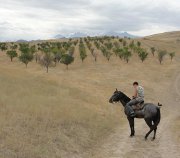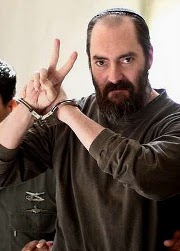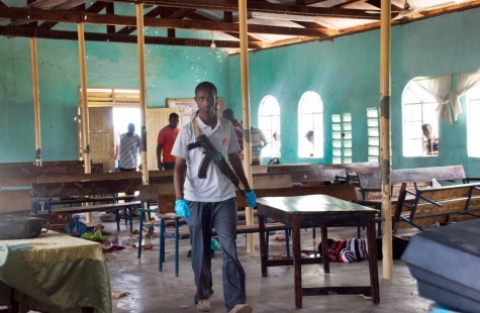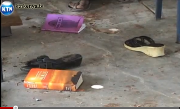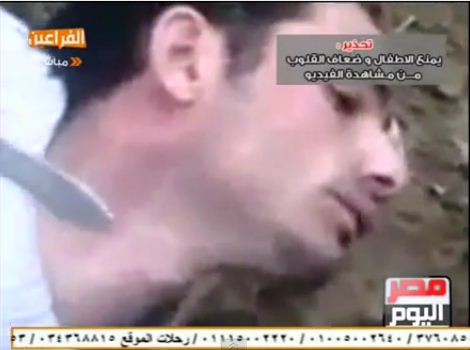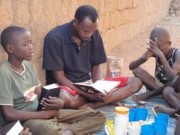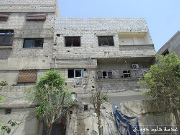Senior International Correspondent, ASSIST News Service
RASHT, IRAN (ANS) -- Iranian Pastor Yousef Nadarkhani, who has spent nearly 1,000 days in prison on charges of apostasy, may face fresh charges in September, pertaining to crimes against national security and possibly blasphemy, according to Christian Solidarity Worldwide (CSW)www.csw.org.uk.
 |
Pastor Youcef Nadarkhani
|
CSW says in a media update that it understands a date for the new trial may have been set for September 8, 2012.
Pastor Nadarkhani is currently in prison facing the death sentence for apostasy, which was upheld following an appeal at the Supreme Court. He was arrested in his home city of Rasht in 2009, soon after questioning the Muslim monopoly of religious instruction for children, which he felt was unconstitutional.
CSW says Nadarkhani’s case has twice been referred to the Supreme Leader of Iran, who has yet to issue a final ruling. He has been offered freedom in exchange for renouncing his faith on at least four occasions, but has consistently refused to do so.
CSW also stated that without the intervention of Supreme Leader Ayatollah Ali Khamenei, or Mr. Sadegh Larijani, the Head of the Iranian Judiciary, who have the authority to halt an execution, the authorities are obliged to carry out the Supreme Court ruling, which stated that Pastor Nadarkhani could be executed if he refused to recant.
Sunday July 8, 2012, will mark 1,000 days since Pastor Nadarkhani was imprisoned.
CSW’s Advocacy Director Andrew Johnston said: “CSW is deeply concerned at reports that Pastor Nadarkhani may face fresh charges in September. The Iranian government is increasingly bringing charges against Christians on political grounds to mask the fact that like Pastor Nadarkhani and Pastor Fathi Malayeri, they have been arrested and imprisoned solely on account of their faith.
 |
Lakan Prison where Youcef Nadarkhani is being held and where he has been imprisoned
for the last 1,000 days. (Courtesy PTM) |
“We are also concerned by the lack of due process in these cases and continue to call for the immediate and unconditional release of Pastor Nadarkhani, Pastor Fathi Malayeri and others who are unjustly imprisoned or facing execution following flawed judicial processes. CSW urges the Iranian authorities ensure respect for the right to freedom of religion, which is guaranteed in the international covenants to which Iran is a signatory, including the International Covenant on Civil and Political Rights (ICCPR).”
Jason DeMars of Present Truth Ministries (www.presenttruthmn.com ) told ANS, “We received some news that Russian Orthodox Church Patriarch Kirill wrote a letter to the Supreme Leader, Ayatollah Khameini, requesting the pardon of brother Youcef Nadarkhani.”
The details are based on an Interfax (www.interfax-religion.com ) report titled: “Iranian ayatollah promises Russian Church to solicit pardon for convicted pastor.”
The report, datelined Moscow, June 27, 2012, says “Iran will probably pardon Protestant pastor ‘Jusef’ [their spelling] Nadarkhani, sentenced to death for his recantation of Islam and coming to Christianity, Secretary General of the World Assembly for Proximity of the Islamic Schools of Thoughts Ayatollah Mohammad-Ali Taskhiri told Metropolitan Hilarion of Volokolamsk, the head of the Synodal Department for External Church Relations, in Moscow.”
The report says: “We are aware that Nadarkhani's life depends on the Iranian supreme leader, Ayatollah Khamenei, who is to pass the final verdict,” Metropolitan Hilarion said.
It states: “Patriarch Kirill of Moscow and All Russia asked the Iranian spiritual leader in September 2011 to pardon the pastor, he said, adding the he himself had referred the same request to Iranian President Mahmoud Ahmadinejad.
It adds: “Ayatollah Taskhiri said in a reply, citing his sources, that the death sentence on the Iranian pastor had been overturned and assured Metropolitan Hilarion that after his return to Iran he would hand over the Russian Patriarch's request for the pastor's pardon to the office of the Iranian spiritual leader,” the External Church Relations Department said on its website.
The Interfax report said Taskhiri is the leader of an Iranian delegation that has arrived in Moscow to attend a meeting of the Russian-Iranian Commission for Orthodox-Islam dialogue.
The Interfax report added: “The death sentence handed down to Nadarkhani on September 22, 2010, caused a global resonance. The death sentence was condemned by the White House. Notorious American Pastor Terry Jones burnt the Koran in protest against the arrest of his Iranian colleague.”
DeMars told ANS: “Our sources in Iran have informed us that Youcef has been officially notified of a new trial for crimes against national security in September. We assume by implication that this means the charges of apostasy have been dropped since the new charges have been issued, but we have no confirmation of that.”
DeMars added: “At this point we need to keep Youcef’s case in the news. Please publicize this information. Youcef has not committed any crimes against Iran’s national security. He was the pastor of a network of house churches in Rasht and was not performing any political activities against the state. In fact, they pray for their country and its leaders.”
Christian Solidarity Worldwide (CSW) is a Christian organization working for religious freedom through advocacy and human rights, in the pursuit of justice.
Present Truth Ministries (PTM) supports missionaries in the Middle East, providing relief for families of pastors imprisoned for their faith. PTM may be contacted through its websitewww.presenttruthmn.com
For further information on CSW or to arrange interviews with CSW staff, please contact Kiri Kankhwende, Press Officer at Christian Solidarity Worldwide on +44 (0)20 8329 0045 / +44 (0) 78 2332 9663, email kiri@csw.org.uk or visit www.csw.org.uk .
| ** Michael Ireland is the Senior International Correspondent for ANS. He is an international British freelance journalist who was formerly a reporter with a London (United Kingdom) newspaper and has been a frequent contributor to UCB UK, a British Christian radio station. While in the UK, Michael traveled to Canada and the United States, Albania,Yugoslavia, Holland, Germany,and Czechoslovakia. He has reported for ANS from Jamaica, Mexico, Nicaragua, Israel, Jordan, China,and Russia. Michael's volunteer involvement with ASSIST News Service is a sponsored ministry department -- 'Michael Ireland Media Missionary' (MIMM) -- of A.C.T. International of P.O.Box 1649, Brentwood, TN 37024-1649, at: Artists in Christian Testimony (A.C.T.) International where you can make a donation online under 'Donate' tab, then look for 'Michael Ireland Media Missionary' under 'Donation Category' to support his stated mission of 'Truth Through Christian Journalism.' Michael is a member in good standing of the National Writers Union, Society of Professional Journalists, Religion Newswriters Association, Evangelical Press Association and International Press Association. If you have a news or feature story idea for Michael, please contact him at: ANS Senior International Reporter |  |




